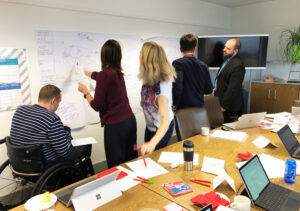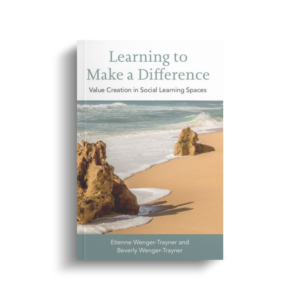We had an interesting online conversation with members of KC Blue, the community-leader community at IBM. The meeting was hosted by Laurie Miller and Sandy Yarchin. Many of the members have followed Etienne’s writings to cultivate IBM communities so it felt like a meeting with friends.
Information anxiety
We addressed many topics, but a highlight for us was much of the conversation focused on dealing with the excess of information and multiplicity of communities – referred to as “information anxiety” by Ed Easton.
Identity question
An identity question for members knowing who they are (becoming) in relation to so much information from different sources. A practical question for community leaders is how to filter, summarize, recycle and highlight that information.
Participating at different levels
In the discourse on communities, we are sensing a shift from the challenge of producing resources to helping people find their way through the maze of resources and potential places of participation. Similarly the goal of cultivating communities is moving from an exclusive focus on inviting maximal participation from members to a focus on enabling people to participate at the level that fits the context of their membership in a multiplicity of communities.
Tools for integrating, aggregating and regrouping
And when we talked about technology for communities, we talked about tools to help people manage their multi-membership. We talk less about community platform than about the best tool to integrate, aggregate, synchronize and re-group information, activities and people across the landscape. Aggregators, dashboards and mobile devices are the way forward for this.
Information filtering practices
The kinds of practices we have seen developed for filtering information include:
- Creating summaries of conversations
- Storing summaries in a shared online space such as a wiki
- Using visuals (including wordless), images and mind-maps rather than linear text for conversation summaries
- Having an “all you need to know” or a FAQ page
- Using tags in ways that represent the perspective of the community
- Setting up leadership groups to steward certain types of information, including information that could be valuable for community members and information that is aimed at external stakeholders.
Practices for different levels of participation
Practices we have seen developed for dealing with different levels of participation are:
- Offering a guide to light participation
- Valuing and encouraging brokers and bridges between communities
- Acknowledging and weaving in “peripheral” voices
- Setting up leadership groups to serve as stewards for periphery voices
Partnership as mutual filtering
As we operate in this world of overload and multiplicity a communities often become partnerships among people who help each other cope with the abundance of information in a certain domain. Community members build their reputation by acting as filters for information — finding and passing on relevant nuggets. But communities need to be resourced to create this kind of filtered access to relevant information and participation because it is quite work-intensive.








Thanks for the time and fruitful insight. Information anxiety is a problem which has existed for along time now – take example of multi brand grocery store. What’s good and what’s not – so much to choose from. The bigger problem I see is that there is a big group which needs to get on to their feet and come to the social learning grocery store! This chunk is absent from the online networking sphere.
Hi Khalid… congratulations for being one of the first to post a comment on our new site!
Did you ever live in the times when there were only two shampoos to choose from in that grocery store? Pre info-anxiety days!
Say more about what kind of things you find in the social learning grocery store?
I appreciate your perspective on this topic. I just finished reading Barry Schwartz’ book “The Paradox of Choice: Why More is Less”. Although written in 2004, it is more relevant than ever. Some great ideas for limiting choices, managing anxiety related to choice overload, and re-orienting ourselves in a world where information can be overwhelming.